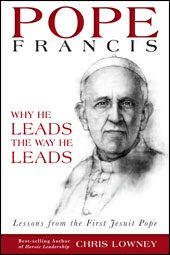By Tim Muldoon
Review of Chris Lowney’s Pope Francis: Why He Leads the Way He Leads
 About a decade ago, I wrote a book on Ignatian spirituality—that is, the tradition of prayer and spiritual exercise rooted in the writings of Saint Ignatius of Loyola, the founder of the Jesuit order. It was early in the Amazon era, and I found that my small book was put in categories that matched other treatments of the same topic. One of those books which immediately surprised me was Chris Lowney’s Heroic Leadership. Looking more closely, I discovered that his model was the Jesuit order, which he himself had been a novice in before moving on to work in the corporate world.
About a decade ago, I wrote a book on Ignatian spirituality—that is, the tradition of prayer and spiritual exercise rooted in the writings of Saint Ignatius of Loyola, the founder of the Jesuit order. It was early in the Amazon era, and I found that my small book was put in categories that matched other treatments of the same topic. One of those books which immediately surprised me was Chris Lowney’s Heroic Leadership. Looking more closely, I discovered that his model was the Jesuit order, which he himself had been a novice in before moving on to work in the corporate world.
I was later asked to review the book, and I must admit that I was very skeptical. I have always more or less hated the leadership genre, finding many of its books rooted in trite pop-psychology dressed up in language like “synergy” and “metrics.” I feared I was taking a cold shower from someone who drew a couple of ideas from theology, then told everyone how glorious it was to make millions of dollars.
Happily, I was wrong. Lowney’s book was not only engaging; it upended my preconceptions. Here was someone who had not merely dipped his toes in the Ignatian tradition; he had swum in the ocean of it, then gone off to teach swimming in other pools.
Lowney has dedicated a chapter of his career practicing what he preached in that book. He helped launch the Jesuit Commons initiative, which aims to network the many Jesuit institutions around the world for the sake of benefitting poor communities; Contemplative Leaders in Action, which trains young professionals in prayer and service; and Pilgrimage for our Children’s Future, funding healthcare for impoverished children.
All this is a preface to saying that I appreciate what Chris is doing as a fruit of his Jesuit training: constantly discerning the great good that God is calling him to undertake in the world, very much like Pope Francis.
His new book picks up where Heroic Leadership and his later book Heroic Living left off, focusing on how the Pope leads in a distinctly Ignatian way. What we can learn from him, Lowney writes, is that leadership involves self knowledge (chapter 3), service (4), immersion in the world (5), yet willingness to withdraw from it (6), reverence for tradition (7) but willingness to create the future (8). All these, he writes, are lessons for all people, reflecting Ignatius’s own willingness to engage with all people and find God in all things. Fundamentally, Lowney’s model of leadership is spiritual: it is rooted in the kinds of persons leaders become by the way they live. For Jesuits, that means following Jesus; but there is more. He writes,
The Jesuit founder envisioned a religious order plunged into the world, not sheltered in monasteries. Hence, he had to develop practices conducive to success amid the chaotic, distracting, tempting, confusing busyness that characterizes the work world.
Fundamentally, the Jesuits are about mission: they are about a shared goal, meaning that they are trained to focus on adapting in whatever way is necessary to accomplish the task, especially at the frontiers of society. Lowney suggests in his book that sharing a mission with others is at the heart of leadership. It is a worthwhile read for anyone who similarly feels driven by mission.
Tim Muldoon teaches at Boston College and serves in its Division of University Mission and Ministry. He is the co-author with his wife, Sue, of a new book called Six Sacred Rules for Families: A Spirituality for the Home.













